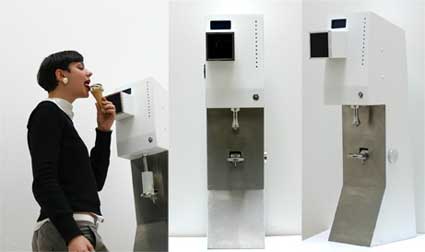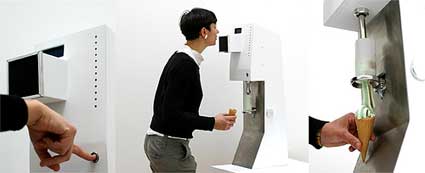Unhappy? Eat More Ice Cream... Get Fat... Get More Unhappy...
Dr. Whippy, had people queue despite the wet wet weather in the streets of Linz during ars electronica. The machine proffers soft scoop ice cream according to the perceived unhappiness level of the customer.

"Employing voice stress analysis of the user’s answers to specific questions, varying degrees of unhappiness are measured and the counteractive quantity of ice cream is dispensed: The more unhappy you are, the more ice cream you need."

The project, developed by Demitrios Kargotis, was partly funded by the Royal College of Art-Platform 11. Technical Assistance: Bjorn Franke. Images courtesy of Noam Toran. A few more taken in Linz.
Atheist Societies are Happy Societies
1. Sweden
2. Vietnam
3. Denmark
4. Norway
5. Japan
6. Czech Republic
7. Finland
8. France
9. South Korea
10. Estonia
From the paper:
High levels of organic atheism are strongly correlated with high levels of societal health, such as low homicide rates, low poverty rates, low infant mortality rates, and low illiteracy rates, as well as high levels of educational attainment, per capita income, and gender equality. Most nations characterized by high degrees of individual and societal security have the highest rates of organic atheism, and conversely, nations characterized by low degrees of individual and societal security have the lowest rates of organic atheism. In some societies, particularly Europe, atheism is growing. However, throughout much of the world – particularly nations with high birth rates – atheism is barely discernible.
Read the Full Study Here




